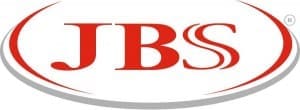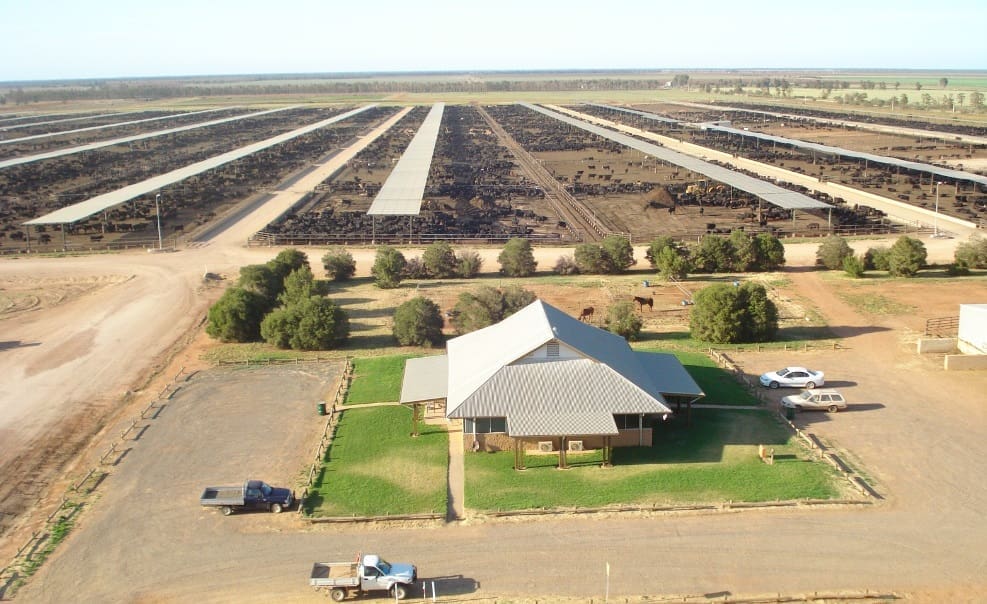THE world’s largest meat processor, JBS, has announced plans to sell its five Australian feedlots to fund manager, Rural Fund Group.
In a separate transaction, Rural Funds Group will undertake a supply agreement, buying the five feedlots’ cattle inventory, currently owned by J&F Australia, through a finance facility worth $250 million.

This values the combined agreements between the companies at just over $300 million.
JBS currently controls feedlot

operating capacity of around 150,000 head, plus cattle in backgrounding programs. Approximate annual turnoff is around 400,000 grainfed cattle each year.
The investor in the deals announced today, Rural Funds Group, is an Australian ASX-listed real estate investment trust. It owns a $687m portfolio of diversified agricultural assets including almond and macadamia orchards, poultry farms, vineyards, water entitlements, cattle and cotton assets, all of which are leased to long-standing tenants (see further details in today’s separate story).
Under the agreements, described as a ‘strategic partnership’ in a joint statement issued this morning, JBS will lease back the feedlot assets for a period of ten years, with a re-purchase option at any time after year five.
Some years ago, ownership of the cattle on feed at JBS Australia’s feedlots changed from JBS to a second entity controlled by the Batista family, J&F Australia. Under the process announced today, Rural Funds Group will acquire J&F Australia.
The Australian deal parallels JBS’s sale in June last year of its Five Rivers feedlot operations in the US, to investor Pinnacle Asset Management. Five Rivers is the world’s largest cattle feeding business, with 11 US commercial feedyards in six US states with a one-time capacity of around 980,000 head (see earlier report).
At the time of the Five Rivers sale, Brazilian parent company JBS SA said a divestment program of “non-core and less strategic assets” had been presented by senior management to the company’s board of directors for analysis. Directors estimated that the divestment program would result in a capital injection worth A$2.5 billion, including funds generated through the sale of JBS processing operations in Argentina, Paraguay and Uruguay to Minerva (see earlier report), European meat processor Moy Park, and its shareholding in Vigor Alimentos, the sixth largest dairy company in Brazil.
Included in the JBS Australian feedlots transaction announced today are five large, strategically-located commercial feed yards, with a combined operating capacity of around 135,000 Standard Cattle Units. The portfolio includes Beef City feedlot near Toowoomba (26,500 head); Riverina feedlot, Yanco NSW (53,000 head); Prime City Griffith NSW (35,000 head); Caroona feedlot via Quirindi, NSW (23,500 head); and Mungindi, NSW (12,000 head). Click here to see a JBS profile in Beef Central’s earlier Top 25 Lotfeeders report.

JBS Prime City yard near Tabbita in NSW
Most of the JBS Australian feedlot assets were acquired as part of the company’s purchase of Australia Meat Holdings in 1996, with the exception of Riverina feedlot (previously known as Rockdale), purchased separately.
The feedlot network plays a critical supply assurance role for JBS’s beef processing operations, delivering a range of domestic and export-weight grain-finished stock year-round. Production ranges from shortfed MSA yearling for the domestic trade to mid-fed Angus and longfed Wagyu programs.
Sale rumours
In February this year, rumours circulated that JBS might be positioning to sell some of its Australian holdings to raise funds. Click here to view Beef Central’s earlier story, where the company denied the suggestion.
At the time, CEO Brent Eastwood was adamant that no JBS Australian ‘businesses’ would be sold. He did not, however, reference ‘assets’ held within those businesses.
Under today’s agreement, JBS will continue to operate the yards as normal, while RFM will simply act simply as the ‘landlord.’ Existing JBS staff employed in the feedlot division will continue as normal.
‘Business as usual’ for JBS feedlot operations
JBS Australia director John Berry said it would be ‘business as usual’ following the feedlot and cattle sale transactions.
“The agreement maintains JBS as a leader in Australian grainfed beef production,” Mr Berry said.
“We have the long-term customers, both from a supply and export perspective, and importantly we will continue to be out there in the market, competing for cattle, as normal,” he said.
“Importantly, JBS will continue to manage all five feedlots, on a day-to-day basis, and therefore continue our current pricing and commercial arrangements.”
“We’re very proud of the capacity and long-term success of the JBS grainfed business in Australia. We consider it the best grainfed business in the country,” Mr Berry said.
In this morning’s statement JBS Australia chief executive Brent Eastwood said similar financial arrangements were ‘fairly commonplace’ in the Australian agricultural sector, and the company’s agreement with Rural Funds Group had no impact on grainfed producer suppliers to JBS Australia.
“The agreement will allow JBS Australia to continue ‘business as usual’ with our customers and grainfed cattle supplier partners, while establishing a long term relationship with one of the country’s most respected Australian-owned funds to pursue future opportunities,” Mr Eastwood said.
J&F’s crisis in Brazil
JBS Australia’s Edison Alvarez said there was no direct link between the decision to sell the Australian feedlot assets with the Batista family’s widely published problems in Brazil.
The only link was on the cattle side, where J&F Australia, controlled by the Batistas, owns the cattle in JBS Australia’s feedlots.
As Beef Central has highlighted over the past 12 months, the actions taken in Brazil by the Batista brothers through their J&F Investimentos entity do not implicate the JBS processing business.
Asked by Beef Central whether the freed-up funds from the sales would be repatriated to Brazil, or used for investment in efficiency and productivity gains in Australia, JBS’s Edison Alvarez said the $53m raised from the feedlot sales would unlock capital for reinvestment into the company, funding working capital and potential expansions in other parts of the business.
He ruled out any prospect of any of the five yards feeding cattle for any other end-user, apart from JBS under the new arrangements.
- Beef Central asked whether Paul Lederer, who sold his family’s Primo smallgoods business to JBS some years ago for $1.4 billion, was involved in the RFM/JBS feedlots transaction in any way. We were told he was not.
- To subscribe to Beef Central’s free daily news email click here
